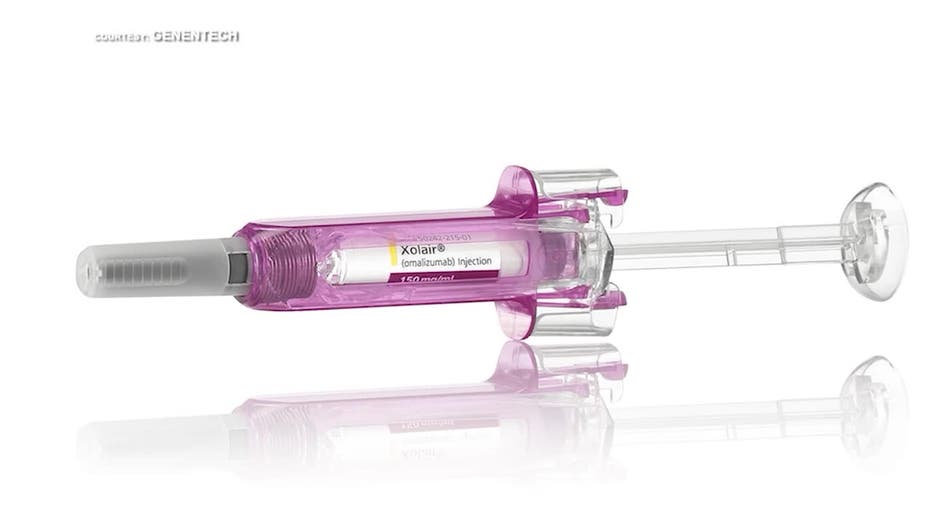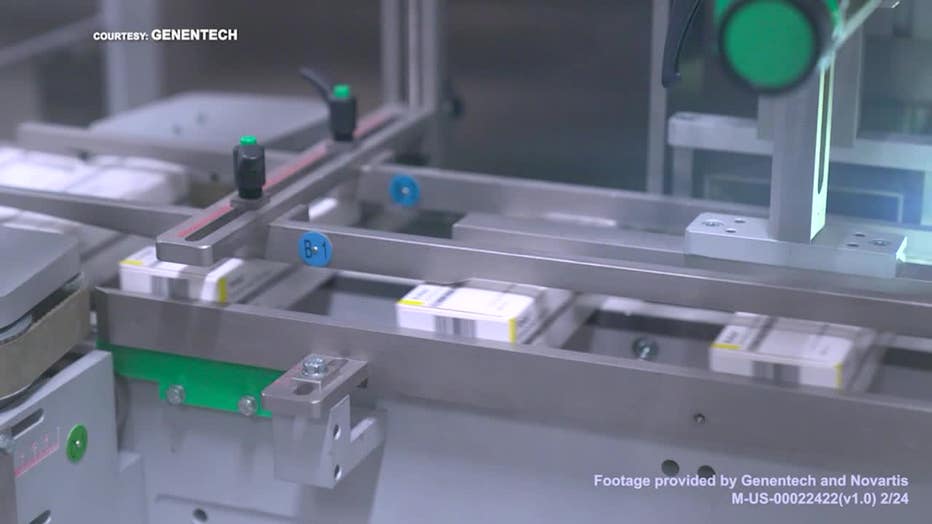FDA authorizes new treatment for accidental food allergy exposures

What is Xolair? FDA approves new food allergy drug
A new medication called Xolair may help with accidental exposures to food allergies like peanuts or dairy. According to FOX Medical Team's Beth Galvin, it isn't an "emergency" medication like an EpiPen.
ATLANTA - If you have to be vigilant about what you eat, and keep an EpiPen close, Dr. Tom Chacko of Chacko Allergy, Asthma and Sinus Center, says the newly FDA-authorized allergy medication, Xolair, might be worth looking into.
Chacko already prescribes Xolair for some of his patients with allergic asthma and chronic hives, but the medication is now cleared for use in people ages 1 and up with multiple food allergies.
"It's really for people who are worried about accidental exposures," Dr. Chacko says.
Using Xolair for food allergies
Patients on Xolair will still have to avoid the foods that trigger their allergies, he says, and they will continue to need prescribed epinephrine injectors.

However, if they do have an accidental exposure, Xolair is designed to damp down their body's allergic response.
"I think it's a good option for those for whom maybe their food allergy creates this fear, and they have a lot of anxiety about it," Chacko says. "I think in those situations this could be very helpful."
Xolair food allergy study
In a multi-site clinical trial, 177 children age 1 to 17 were randomly assigned to receive either a Xolair injection or a placebo injection every 2 to 4 weeks over a 16- to 20-week period.
All the children in the study were allergic to peanuts and at least two other foods.

The FDA says of the children assigned to the Xolair group, 68% (or 75 of 110 subjects) were able to eat the single dose of peanut protein without moderate to severe allergic symptoms.
That is compared to 6% (3 of 55 subjects) who received placebo.
However, the agency noted 17% of the children in the Xolair group had no significant change in the amount of peanut protein they were able to tolerate.
As a result, the agency says people with food allergies on the medication will need to strictly avoid their allergens.
Battling food allergies such as allergic asthma, chronic hives
Dr. Chacko says he sees several food allergy patients a day in his practice, and most food allergies are mild.
So, he says, the majority of his food allergy patients will not need medication like Xolair.

"If you're fine with just avoiding (a food), just avoid," Chacko says he tells his patients. "But, if it really stresses you out, or, for example, if you're milk-allergic, or egg-allergic, and it's very hard to avoid (these foods), these are something to think about."
Dr. Chacko believes a process known as allergy desensitization may be a more effective option for people with food allergies.
"We give small amounts of the peanut over time, to allow the body to tolerate it," Chacko explains. "We could do that with peanuts, or milk, with eggs, and it's actually a more natural way of the body building up tolerance."
If a patient is still having difficulty tolerating food despite desensitization, he says, combining Xolair injections with desensitization might be a good option.
How much does Xolair cost?
Cost, Chacko says, could be another issue.
Xolair is designed to be used continuously, injected every 2 to 4 weeks.
Used for allergic asthma and chronic hives, the medication typically costs about $3,000 to $4,000 a month.

Because it's now FDA-authorized for people with multiple food allergies, Xolair will likely be covered by most insurance plans.
"It's anywhere between $30,000 to $50,000 a year, in perpetuity," Chacko says. "So, I want to be very clear: this is not a cure, this is not a medication that you will take ongoing, for however long you need it."
He does not anticipate using the medication widely in his Metro Atlanta practice.
"I think it does have some role, but not for everybody by any means," Chacko says.
Side effects of Xolar
The FDA says the most common side effects of Xolair are inject-site reactions and fever.

The drug carries a black box warning because it can cause severe, potentially life-threatening allergic reactions.
For this reason, Chacko says, injections are typically given in a medical setting, where the patient can be observed.
With time, he says, some patients may be able to administer the injections at home.

